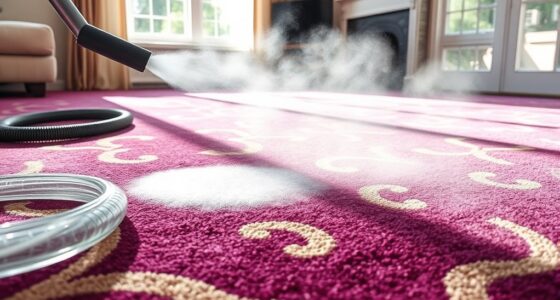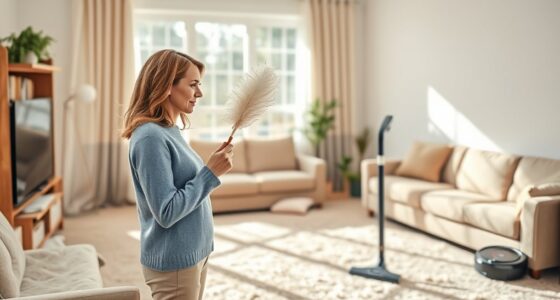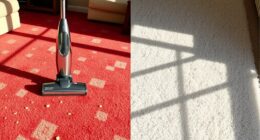Replacing your HVAC filter every three months is a smart move to keep indoor air clean, improve system efficiency, and extend your unit’s lifespan. Regular changes prevent dust, pollen, and pet dander buildup, which can cause allergies and respiratory issues. It also helps your HVAC work less hard, saving you energy and money. Staying consistent with this schedule is easy, and you’ll benefit from better air quality—keep exploring to learn more about maintaining your system effectively.
Key Takeaways
- Replacing filters every three months maintains indoor air quality and reduces allergens.
- Regular changes prevent strain on HVAC systems, enhancing energy efficiency and lifespan.
- Pet owners and allergy sufferers may need more frequent filter replacements than quarterly.
- Monthly filter checks help determine if early replacement is necessary.
- Automation tools can monitor filter status and alert you when it’s time to replace.

Have you ever wondered if you’re changing your HVAC filters often enough? Maintaining a regular schedule for replacing your filters is essential for keeping your home comfortable, safe, and energy-efficient. When you change your filters every three months, you help ensure ideal air quality, which is vital for your health and well-being. Dirty filters can trap dust, pollen, pet dander, and other airborne pollutants, reducing indoor air quality and potentially aggravating allergies or respiratory issues. By sticking to a quarterly replacement schedule, you maintain cleaner indoor air, making your living environment healthier for everyone.
Changing HVAC filters every three months ensures cleaner air and better system efficiency.
In addition to improving air quality, changing your filters regularly plays a significant role in maximizing your HVAC system’s energy efficiency. When filters are clogged with dirt and debris, your system has to work harder to circulate air throughout your home. This extra effort consumes more energy, leading to higher utility bills and increased wear and tear on your system. By replacing filters every three months, you reduce the strain on your HVAC unit, helping it run smoothly and efficiently. Over time, this can extend the lifespan of your system and save you money on repairs or replacements.
It’s important to recognize that the frequency of filter changes may vary depending on your living situation. If you have pets that shed or someone in your household has allergies, you might need to change filters more often, perhaps every 1 to 2 months. Similarly, if you live in an area with high levels of pollution or dust, a quarterly schedule is a good rule of thumb, but you should stay attentive to the state of your filters. Checking them monthly can help you determine if they need to be replaced sooner. Conversely, if your home is less dusty and you don’t have pets, you might stretch this schedule slightly, but sticking to three months remains a reliable guideline. Additionally, automation technologies in HVAC systems can assist in monitoring filter status and alerting you when replacements are needed.
Ultimately, maintaining a consistent schedule for replacing your HVAC filters is a simple yet effective way to protect your air quality and ensure your system operates efficiently. It takes just a few minutes each quarter, but the benefits—cleaner air, lower energy bills, and a longer-lasting HVAC system—are well worth the effort. Don’t wait until you notice poor airflow or increased energy costs; proactively changing your filters every three months keeps your home healthier and your system running at its best.
Frequently Asked Questions
Can I Replace HVAC Filters More Frequently if I Have Allergies?
Yes, you can replace your HVAC filters more frequently if you have allergies. Doing so improves air quality and reduces allergens in your home. Changing filters every month instead of every three months helps maintain ideal filter lifespan, preventing buildup of dust, pollen, and other irritants. Regular replacements ensure your HVAC system runs efficiently and keeps the indoor air clean and healthy for you.
What Types of Filters Are Best for High-Efficiency Air Cleaning?
For high-efficiency air cleaning, you should choose filters with HEPA filtration and activated carbon. HEPA filters trap tiny particles like pollen, dust, and mold spores, making them ideal for allergies. Activated carbon filters absorb odors and chemical pollutants, improving indoor air quality. Combining these two types provides thorough filtration, especially if you have sensitivities. Confirm your HVAC system supports these filters, and replace them as recommended for peak performance.
How Do I Recycle or Dispose of Old HVAC Filters Properly?
You should check recycling guidelines in your area for proper disposal. Many HVAC filters, especially those made of fiberglass or pleated materials, aren’t recyclable through regular programs. Instead, you can dispose of them in your regular trash, but consider using designated disposal methods if available. For filters with hazardous materials or chemicals, follow specific disposal instructions to guarantee safety and environmental protection. Always verify local regulations before discarding old filters.
Are There Signs Indicating I Need to Replace My Filter Sooner?
You should replace your filter sooner if you notice discoloration or a significant airflow reduction. Discolored filters indicate accumulated dirt and allergens, while reduced airflow suggests your filter is clogged and less effective. Don’t wait until the scheduled three months if these signs appear, as it can strain your HVAC system and decrease air quality. Regularly check your filter, and replace it promptly when these signs become evident.
Does Using a Higher Merv-Rated Filter Improve Air Quality?
Using a higher MERV-rated filter can improve air quality, but it may also cause airflow restriction. This restriction can reduce your filter’s lifespan because the HVAC system has to work harder. If you choose a higher MERV, check your system’s specifications and monitor airflow to guarantee it doesn’t strain your equipment. Proper maintenance and timely replacement help balance air quality benefits with ideal filter lifespan.
Conclusion
Sticking to a 3-month HVAC filter replacement schedule is like giving your home a gust of fresh air—it keeps the air clean and your system running smoothly. Don’t let dust and dirt build up like clutter in a closet. By staying consistent, you’ll enjoy better air quality, lower energy bills, and a longer-lasting HVAC system. Make this simple habit part of your routine, and your home will feel fresher and healthier all year round.









